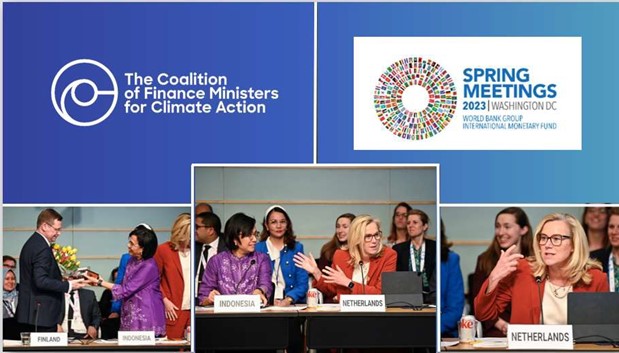The Coalition of Finance Ministers for Climate Action's 9th Ministerial Meeting

Leading Finance Ministers advance their work on tackling climate change and securing a just transition, launching a new framework and guide for driving climate action.
This press release was first published by the Coalition of Finance Ministers for Climate Action on 14 April 2023.
On 14 April 2023, The Coalition of Finance Ministers for Climate Action, a group of the world’s leading fiscal and economic policymakers, gathered in Washington DC to make sure climate change and a socially just transition to a low-carbon economy are firmly on the macro-economic and fiscal agenda.
The Coalition, consisting of 84 major Finance Ministries and 26 Institutional Partners, came together at the World Bank and IMF 2023 spring meetings to launch a new guide on how Ministries of Finance can support climate action by finance ministries, and discuss the next steps on ‘transition finance’.
To help secure the double dividend of reducing poverty and stopping climate breakdown, the Coalition launched a new brief: ‘Strengthening the Role of Ministries of Finance in Driving Climate Action’. Based on over 140 country case study examples, the guide offers concrete steps for Finance Ministers to strengthen their engagement in climate action and focus their efforts towards achieving an economically and socially sustainable green transition. The Grantham Research Institute on Climate Change and the Environment has been the lead coordinator on the drafting of the report and guide.
The new co-chair of the Coalition, Deputy Prime Minister and Minister of Finance from the Netherlands, Sigrid Kaag, said:
“The global transition towards a socially just, low-carbon economy presents unprecedented challenges but immense opportunities. The gathering of the Coalition is a unique forum where members can have an open discussion about their respective policy challenges and plan the next steps for tackling climate breakdown whilst simultaneously creating new jobs, boosting energy security and reducing poverty.”
Finance Ministers also acknowledged that the global financial ecosystem is not set up to offer the transition finance needed for high carbon-emitting industries and activities (such as coal-fired power generation, steel, cement, chemical, paper-making, aviation and construction) to decarbonise effectively.
Finance Ministers encouraged the establishment of well-accepted definitions of transition activities, credible disclosure and reporting frameworks, and globally-accepted registry systems to prevent greenwashing by carbon-intensive firms. Ministers also recognised that they can play a greater role in supporting the private sector’s transition to net zero, for example through regulatory power.
Co-chair of the Coalition and Finance Minister for Indonesia Sri Mulyani further explained the importance of transition finance:
“Climate and development are two sides of the same coin; fragmenting the two will drive resource competition and division in our efforts to achieve the Paris Agreement targets. To align with the Paris Agreement, scaling up transition finance is extremely important as it supports activities that promote a long-term and strategic transition towards a low-carbon economy.
Therefore, we need to develop a transition finance ecosystem that enables sufficient mobilization of transition financing. This includes developing clear and globally accepted definitions of transition activities and taxonomies that acknowledge transition activities. Additionally, it is equally important to establish the institutions to support the inter-operability of transition finance mobilisation, such as globally-accepted registry and verification bodies.”
Finance Ministers acknowledged that many countries lack the technical knowledge to make the sustainable changes required in the transition to a low-carbon society. To transfer thought leadership into policy practice, the Coalition is supporting a variety of capacity-building programmes to implement new policies and processes while also developing knowledge and competencies.
Having provided strong leadership for the Coalition over the last four years, and having played a crucial role in the publication of the aforementioned guide, outgoing co-chair and Minister of Finance for Finland Annika Saarikko said:
“The guide reflects the magnitude of actions ahead for Finance Ministries in mainstreaming climate into economic, fiscal and financial policies. The Coalition will be a strong network in supporting these actions. It has been great privilege leading the Coalition in the past four years, first with Chile and then with Indonesia, working together with more than 110 finance ministries and partners. We wish the Netherlands success in taking the lead from today onwards, together with Indonesia.”

